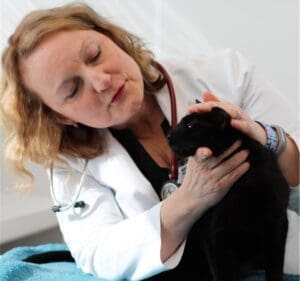Hair Loss in Cats: What Could be Causing This?
Hair loss in cats can be a concerning and frustrating issue for pet owners. Not only is it distressing to see your furry friend losing their fur, but hair loss can also be a sign of underlying health issues that need to be addressed.
Hair loss in cats can be caused by a variety of factors, including allergies, skin infections, parasites, hormonal imbalances, stress or anxiety, and poor nutrition. To diagnose the cause, your veterinarian may perform a physical exam, take skin scrapings, or run blood work. Treatment options for your cat may include medication and dietary changes. It is important to seek veterinary care for hair loss in your cat to determine the cause and find an appropriate treatment plan.
In this article, we will delve into the reasons your cat may be losing hair, how to diagnose the cause, and the treatment options available. It is important to seek the advice of a veterinarian to determine the cause of your cat’s hair loss and develop an appropriate treatment plan.
Common Causes of Hair Loss
Hair loss in cats can be caused by a variety of factors, including allergies, skin infections, and parasites. Allergies, whether to food or environmental triggers, can cause inflammation and irritation on the skin, leading to hair loss.
Skin infections, such as ringworm or bacterial infections, can also cause hair loss as the body’s immune system tries to fight off the infection. Parasites, such as fleas or mites, can also cause hair loss as they irritate the skin and cause scratching and biting, leading to hair loss and damaged skin.
Allergies
Allergies are a common cause of hair loss in cats and can be triggered by a variety of substances, including certain foods, medications, or environmental factors such as dust or pollen. It is important to identify and address the underlying allergy in order to effectively treat their hair loss and prevent further issues.

Skin Infections
Skin infections, such as dermatitis and ringworm, can lead to hair loss in cats. These infections can be caused by bacteria, fungi, or parasites, and can be treated with medications prescribed by a veterinarian. In some cases, the underlying cause of the infection must also be addressed, such as identifying and eliminating any allergens or irritants in the cat’s environment. It is important to diagnose and treat skin infections as soon as possible, as they can cause discomfort for the cat and can lead to further complications if they are left untreated.
Parasites
Parasites, such as fleas, mites, and lice, can cause hair loss in cats. These parasites can cause irritation and inflammation of the skin, leading to excessive scratching and grooming. This can lead to bald patches on the skin. It is important to regularly treat your cat for parasites to prevent hair loss and other health problems that may arise. If you suspect that your cat may have a parasite infection, it is important to consult with your veterinarian for proper diagnosis and treatment immediately as parasites can cause a variety of health issues in your pet.
Hormonal Imbalances
Hormonal imbalances can be a cause of hair loss. These imbalances can be caused by various factors, including changes in the cat’s diet, medications, or underlying medical conditions.
Stress or Anxiety
Stress or anxiety can also be a factor leading to your cat’s hair loss. Cats may lose hair due to chronic stress or anxiety caused by a variety of factors, including changes in their environment, changes in routine, or the presence of a new pet or person in the household.
Poor Nutrition
A diet that is lacking in essential nutrients or is unbalanced can lead to poor coat condition and hair loss. It is important to ensure that your cat is receiving a high-quality diet that meets its nutritional needs in order to maintain a healthy coat and skin.

Diagnosing the Cause of Hair Loss in Cats
To diagnose the cause of hair loss in cats, a veterinarian will start by performing a physical exam and examining the affected area. They may also take skin scrapings to test for parasites or infections, and perform blood work to check for underlying health conditions or hormonal imbalances. They may perform a skin cytology looking for infection, perform a skin scraping to check for parasites, or perform bloodwork. Understanding the root cause of hair loss is crucial in determining the appropriate treatment plan.
Treatment for Hair Loss in Cats
Hair loss in cats can be a frustrating and distressing issue for both the cat and its owner. Fortunately, there are a few different treatment options available for addressing this problem.
- One option is the use of medication, which may be prescribed by a veterinarian to address underlying causes such as allergies or infections.
- Another option is to make dietary changes, such as introducing a higher quality or hypoallergenic diet.
Conclusion
In conclusion, hair loss in cats can be caused by a variety of factors including allergies, skin infections, parasites, hormonal imbalances, stress or anxiety, and poor nutrition. It is important to consult with a veterinarian to properly diagnose the cause of hair loss in order to determine the appropriate treatment for your cat.
If you have any questions about your cat’s health or would like to schedule an appointment, please call us at (317) 257-5334! Here at Broad Ripple Animal Clinic, we are ready to help you and your pet with whatever you may need!
Recent Posts
About Us
Your pet is unique, unconditionally loving, and a valued part of your family, and Broad Ripple Animal Clinic recognizes the incredible bond you share. You can rely on our veterinarians and staff in Indianapolis, IN to be here for you, and be deeply committed to providing the highest level of care each time you visit. This includes giving you a central voice in the care of your pet and making you an integral part of the decision-making process.
Our AAHA-accredited animal hospital delivers a full spectrum of services, advanced technology, comprehensive pain management, and regenerative therapies to promote better healing.
